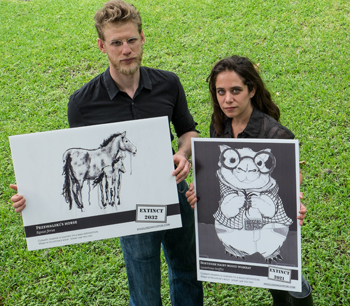A new kind of lawn sign has cropped up around Houston over the past month, displaying eye-catching artist-rendered depictions of horses, wild dogs, sea turtles and corals. The goal of the sign-maker is not to promote a political candidate, but to raise awareness of climate change and its impact on the world’s species. Dubbed “Fossilized in Houston,” this guerilla public art campaign is the brainchild of Matthew Schneider-Mayerson, a postdoctoral fellow in Rice University’s Center for Energy and Environmental Research in the Human Sciences.

Matthew Schneider-Mayerson, a postdoctoral fellow at Rice, and Lina Dib, a lecturer in Rice's Program for Writing and Communication, are leading a campaign to raise awareness of climate change and its impact on the world's species. Photo by Jeff Fitlow
“While some Houstonians might consider graffiti or ‘Fossilized in Houston’s’ signs to be a nuisance, I tend to view these things as the kinds of spaces for democratic expression and debate that this country sorely needs,” said Schneider-Mayerson, who grew up in New York City in the 1980s and ’90s and appreciated the widespread street art he saw there.
The campaign is based on the call to address an urgent crisis brought on by carbon-emission-fueled global climate change, Schneider-Mayerson said. “Half of all wildlife on the planet has disappeared over the last 40 years, and 30 to 50 percent of all existing species are expected to go extinct by 2050. After that? It depends on what we do over the next decade or two,” he said. “The ongoing mass extinction is due to many human factors, including overhunting, overfishing and deforestation, but it is climate change that ensures the holocaust will probably continue for decades.”
Schneider-Mayerson is collaborating with Lina Dib, a 2013 graduate of Rice’s anthropology Ph.D. program and 2014-15 Lawndale Art Center studio artist in residence, and Tony Day, a Houston artist and teacher. They commissioned 15 Houston artists to create representations of species that are expected to go extinct as a result of climate change in the near future. With the help of dozens of concerned Houstonians, they’ve been placing these images around town as lawn signs, posters and stickers.
“In Houston, the ‘Energy Capital of the World,’ you can’t pretend that fossil fuels don’t power our lives like you can in many places,” Schneider-Mayerson said. “We’re trying to reach people when they least expect it — when they’re waiting in line for coffee or driving around their neighborhood, for example.”
The project was an opportunity for Dib, a native of Montreal and lecturer in Rice’s Program for Writing and Communication, to give back to a community she has grown to appreciate. “Getting to know the art community around Houston, it’s been such a great place to me,” she said. “The project was an opportunity to rope in other artists and take advantage of the fact that Houston has such a thriving arts scene.”
The campaign is an example of why engaging the arts and artists is such an important part of the Center for Energy and Environmental Research in the Human Sciences’ mission, said Dominic Boyer, center director and professor of anthropology. “We tend to be desensitized to the environmental changes that are happening around us; some are too abstract or slow-moving to comprehend easily; others we just ignore,” he said. “Art offers unpredictable encounters, disrupts things taken for granted and thus has the potential to give us fresh insights into the challenges that await us. What I find very compelling about ‘Fossilized in Houston’ is how it creates everyday encounters with the reality of species extinction, done beautifully in a way that draws a viewer in and then gets him or her thinking about the trajectory our civilization is on, about how many species are disappearing so that one species can enjoy certain luxuries. The images are haunting and one hopes that they will get people thinking and talking.”
For more information about “Fossilized in Houston,” visit http://fossilizedhouston.com/index.html.

